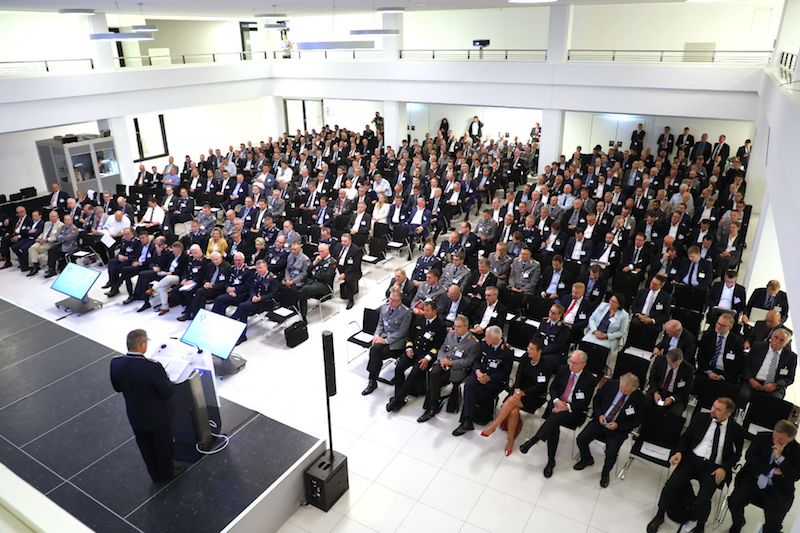Hol Dir den wöchentlichen SPARTANAT-Newsletter.
Dein Bonus: das gratis E-Book von SPARTANAT.

Die Bundeswehr im Zeitalter der Digitalisierung von Technik, Industrie und Gesellschaft
Mit über 500 Besuchern hat die dreizehnte Koblenzer IT-Tagung in der Rhein- Mosel-Halle einen Besucherrekord gefeiert. Gemeinsam beleuchteten die bei- den Veranstalter, das Bundesamt für Ausrüstung, Informationstechnik und Nutzung der Bundeswehr (BAAINBw) und das Anwenderforum für Fernmelde- technik, Computer, Elektronik und Automatisierung Bonn e.V.
Mit über 500 Besuchern hat die dreizehnte Koblenzer IT-Tagung in der Rhein- Mosel-Halle einen Besucherrekord gefeiert. Gemeinsam beleuchteten die bei- den Veranstalter, das Bundesamt für Ausrüstung, Informationstechnik und Nutzung der Bundeswehr (BAAINBw) und das Anwenderforum für Fernmelde- technik, Computer, Elektronik und Automatisierung Bonn e.V. (AFCEA), einen Tag lang aus verschiedenen Perspektiven das Thema „Digitale Kompetenz und Konvergenz im Zeitalter digitaler Systeme“.
Nach der Begrüßung durch Oberst i.G. Heiko Mühlmann, stellvertretender Vorsitzender AFCEA Bonn e.V., und Brigadegeneral Michael Hauschild, Abteilungsleiter I im BAAINBw, sowie dem Grußwort, der Bürgermeisterin der Stadt Koblenz, Ulrike Mohrs, stand der Tag in Koblenz ganz im Zeichen des Jahresthemas des gemein- nützigen Vereins AFCEA Bonn e.V.
Mit Veränderungsmanagement sei bei der Bundeswehr ein besonders „dickes Brett“ zu bohren.
Generalleutnant Michael Vetter, Abteilungsleiter Cyber-Informationstechnik im Bundesministerium der Verteidigung, griff Digitalisierung in seiner Eröffnungsrede als Megathema, Führungsaufgabe und Chefsache für die Bundeswehr auf. Nur die konsequente Umsetzung etwa mit dem Cyber Innovation Hub, dem Forschungsinstitut Code der UniBw in Neuberg oder mit Projekten wie die umfassende Digitalisierung von landbasierten Operationen der Streitkräfte (D-LBO) und einer weiteren Verschränkung mit dem IT-Dienstleister BWI könne die Bundeswehr künftig Informations- und Wirkungsüberlegenheit erzielen. Vetter warnte davor, Digitalisierung ohne Veränderungen in der Führungskultur, Zusammenarbeit und Arbeitsweisen zu betrachten. Mit Veränderungsmanagement sei insbesondere bei der Bundeswehr ein besonders „dickes Brett“ zu bohren.
Professor Dr. Peter Martini, stellvertretender Vorsitzender des Cyber Security Clus- ter Bonn e.V., stellte seinen Verein vor. Ziel des Cyber Security Clusters ist es, die Anziehungskraft für Fachkräfte für Bonn und die Region sowie für Unternehmen schaffen, unter anderem durch noch intensivere Kooperationen und Austausch zwi- schen Hochschulen, Unternehmen und staatlichen Organisation.
Mit den Programmen FOXTROT, D-LBO und TEN zeigten Oberst i.G. Robert Miedema von den niederländischen Streitkäften und Leitender Technischer Regierungsdirektor Christian Peters vom BAAINBw eine besondere Form der Zusammenarbeit auf. Die Digitalisierung der Streitkräfte der beiden Nationen soll in einem gemeinsamen Programm „Tactical Edge Networking (TEN)“ umgesetzt werden. Die heutige Ausstattung ist den neuen, zukünftigen Herausforderungen anzupassen. Mit TEN werden die beiden nationalen Programme FOXTROT (Niederlande) und D-LBO (Deutschland) zusammengeführt, um mit gemeinsamen operativen Anforderungen eine gemeinsame technische Lösung zu erzielen. Bis 2023 sollen dann die ersten Einheiten ausgestattet und operativ sein.
Einen Schritt weiter ging Martin Kaloudis, CEO der BWI, der den Weg der Bundeswehr im Zeitalter der Digitalisierung in Richtung Künstlicher Intelligenz aufzeichnete. Dafür brauche es Konsequenz, Mut und Investitionen, die sich in Deutschland insbesondere im internationalen Vergleich schwer finden lasse. So investiere die US-Regierung allein 800 Millionen US-Dollar, um ein intelligentes System für die Si- mulation von Einsatzszenarien zu entwickeln. Südkorea stecke eine Milliarde US- Dollar in der KI-Grundlagenforschung allein im Bereich Hirnforschung. Und Deutschland? Aus ursprünglich vorgesehenen drei Milliarden Euro seien mittler- weile 500 Millionen geworden – für den Zeitraum von 2020 bis 2023. Künftig wolle die BWI mit dem Cyber Innovation Hub beispielsweise stärker Innovationen nicht nur identifizieren, sondern zügig und bezahlbar in Betrieb nehmen.
Dass Künstliche Intelligenz bei der Bundeswehr eine wesentliche Rolle wird spielen müssen, stehe außer Frage.
Am Nachmittag der Koblenzer IT-Tagung vertieften Fachpodien das Konferenz- thema. Darin diskutierten Vertreter von Bundeswehr, Ministerium und Unternehmen die heutigen und künftigen Einsatzmöglichkeiten intelligenter Systeme im militärischen Kontext. Dass KI bei der Bundeswehr eine wesentliche Rolle wird spielen müssen, stehe außer Frage. Ein besonders streitbarer Punkt dabei: Sollten Waffensysteme überhaupt autonom entscheiden dürfen? Und wenn ja, nach welchen ethischen Richtlinien? Es gehe nicht um unkontrollierbare Killerbots, sondern vor allem darum, durch mehr Informationen taktisch besser entscheiden zu können.
Einen ganz anderen Blick auf die Digitalisierung warf Dr. Alexander Markowetz, Informatiker und Autor. In seinem pointierten Vortrag entwickelte er Zukunftsszenarien, in denen Digitalisierung zu einer vollständigen Dezentralisierung führt und begleitet von zahlreichen Krisen zu einer Abkehr sämtlicher Gegebenheiten führt, die man in den vergangenen 250 Jahren entwickelt habe. „Wir stehen vor dem nächsten fundamentalen Zeitalter – dem digitalen Zeitalter.“
Im Anschluss an den Fachteil der Tagung unter der Leitung von Brigadegeneral Mi- chael Hauschild, und Oberst i.G. Heiko Mühlmann überreichte Dr.-Ing. Michael Wunder, Vorstand AFCEA Bonn e.V., den AFCEA Studienpreis 2019. Dabei wur- den auch dieses Jahr wieder herausragende Studienarbeiten im Themenbereich In- formatik, Nachrichten- und Automatisierungstechnik ausgezeichnet. Die Arbeiten wurden verfasst von jungen Akademikern an Hochschulen und Universitäten im Rhein-Sieg-Kreis, Bonn, Aachen und Koblenz sowie den Bundeswehruniversitäten ausgezeichnet und sind mit einem Gesamtvolumen von 20.000 Euro dotiert.
Über AFCEA Bonn e.V.
Der gemeinnützig orientierte Verein AFCEA Bonn e.V. ist ein Anwenderforum für Fernmeldetechnik, Computer, Elektronik und Automatisierung. Er versteht sich als Fachorganisation für Informations- und Kommunikationstechnik (IuK) und hat sich zum Ziel gesetzt, einen vielfältigen kommunikativen Austausch zwischen Anwen- dern und Anbietern der IuK-Technik zu ermöglichen.
AFCEA im Internet: www.afcea.de
SPARTANAT ist das Online-Magazin für Military News, Tactical Life, Gear & Reviews.
Schickt uns eure News: [email protected]
Werbung
Hol Dir den wöchentlichen SPARTANAT-Newsletter.
Dein Bonus: das gratis E-Book von SPARTANAT.




